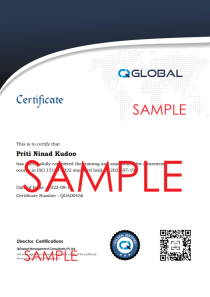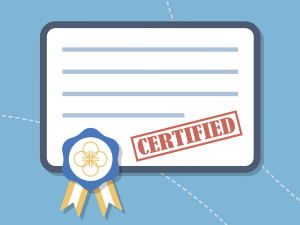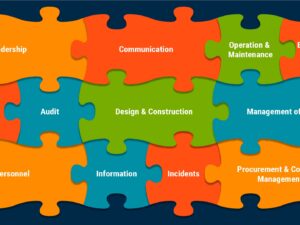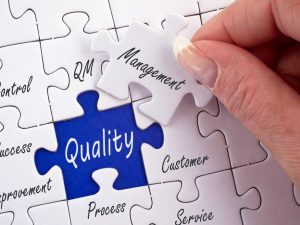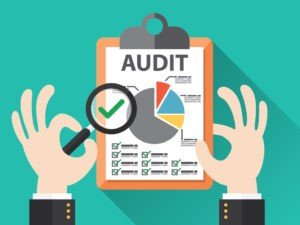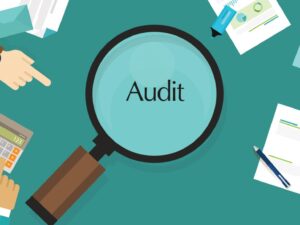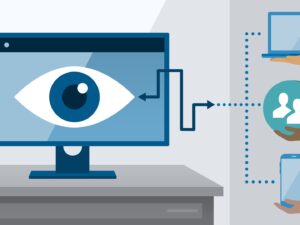ISO 9001 2015 Quality Management System (QMS) - Internal Auditor Course
- Description
- Curriculum

The ISO 9001 standards provide guidance and tools for companies and organizations who want to ensure that their products and services consistently meet customer’s requirements, and that quality is consistently improved. ISO 9001 standards sets out the criteria for a quality management system and is the only standard in the family that can be certified to (although this is not a requirement). It can be used by any organization, large or small, regardless of its field of activity. This standard is based on a number of quality management principles including a strong customer focus, the motivation and implication of top management, the process approach and continual improvement. Using ISO 9001 helps ensure that customers get consistent, good quality products and services, which in turn brings many business benefits. ISO 9001 2015 internal auditor course will help you learn how to initiate an audit, prepare and conduct audit activities, compile and distribute audit reports and complete follow-up activities. On successful completion of this course, you will be able to optimize your auditing skills with the internationally recognized ISO 9001 2015 standard and boost your audit capabilities. Also gain confidence in planning and performing an effective audit, as well as reporting and taking corrective action where necessary. ISO 9001 2015 internal auditor training course develops the necessary skills to assess and report on the conformance and implementation of processes based on ISO 9001 2015.
Who Should Attend?
- Anyone involved in the planning, implementing, maintaining, supervising or auditing of an ISO 9001 2015 quality management system
- Those who like to handle the role of an ISO 9001 2015 internal auditor in an organisation
- Employees of any organisation who wish to audit their organisation’s quality management system
- Those involved in second party audits such as vendor audits
- Personnel who wish to pursue career as an ISO 9001 2015 internal auditor
- Expert advisors in quality management
Key Benefits
- Gain the skills to plan, conduct, report and follow up first and second party audits in accordance with ISO 19011
- Learn skills to lead an internal audit team
- Identify the aims and benefits of an ISO 9001 2015 audit
- Interpret ISO 9001 2015 requirements for audit application
- Grasp the application of risk-based thinking, leadership and process management
- Acknowledge the correlation between ISO 9001 2015 standards and other standards and regulatory frameworks
- Learn the latest techniques in ISO 9001 2015 internal auditing
- Consolidate your expertise with the latest developments and contribute to the continuous improvement of the business
Learning & Evaluation Method
You can take either the self study option or live option for this course. Self study If you opt for the self study option, reading materials, assignments and course exams will be available in your account after purchasing the course. Videos or live sessions are not available in this option. Also you will receive free, unlimited and lifetime access to all our live courses. These live courses are conducted twice yearly as per our convenience. You can attend our free live courses as many times as you wish. Live course If you need a live and interactive course, you can opt for the ‘ BUY FOR A GROUP ‘ option. Live course will have role plays, online workshops, practice questions and group discussions during the course so that each participant will gain in-depth knowledge in the subject. Group purchase can be made for a single participant or for a group of participants. On receiving your order, our team will contact you to schedule a live training session as per your convenience. Also you will receive free, unlimited and lifetime access to all our live courses. These live courses are conducted twice yearly as per our convenience.
Certification
There are increasing numbers of organizations, who prefer candidates those who have certain certifications from recognized programs. Certification demonstrates your commitment to superior professionalism, upholding industry standards, and continued learning. These merits can help boost your professional credibility and prestige within your own network, in your organisation, with your current clients, and when pursuing new business opportunities. After the successful completion of the course and final exam, you will be awarded with a certificate of completion issued by QGlobal. Your credentials will be made available in the global online directory and can be verified by anyone searching with the certificate number. Without doubt we can say that our training courses are well recognized and sought after by organizations across various geographies.
Buy for group Are you planning to buy this course for a group? We have the best prices for you! Select ‘Buy for Group’ option and add to the cart. You will get a discount of 60 – 75% for a group of up to 10 participants. To make a group purchase, create your group name and add individual emails of up to 10 participants. Each participant will get the access to the course materials, exam and the certificate. We will arrange one live-online session for the entire group.
Total: 205 Courses View all
Total: 205 Courses View all
-
1Introduction to standards and certification
- Purpose of standardization
- Benefits of certification
-
2Introduction to ISO 9001 2015 standards
Application areas
Terms and definitions
Quality management principles
Process based approach
Plan-Do-Check-Act cycle
Risk based thinking
Benefits of certification
Certification process flow
-
3Quality management system principles
- Fundamental concepts
- Quality management system principles
-
4Terms and definitions
- Terms related to person or people
- Terms related to organization
- Terms related to activity
- Terms related to process
- Terms related to system
- Terms related to requirement
- Terms related to result
- Terms related to data, information and document
- Terms related to customer
- Terms related to characteristic
- Terms related to determination
- Terms related to action
- Terms related to audit
-
5ISO 9001 Context of the organisation
Understanding the organization and its context
Understanding the needs and expectations of interested parties
Determining the scope of the quality management system
Quality management system and its processes
Quizzes, discussions & role plays
-
6ISO 9001 Leadership
Leadership and commitment
Customer focus
Policy
Establishing the quality policy
Communicating the quality policy
Organizational roles, responsibilities and authorities
-
7ISO 9001 Operation
Operational planning and control
Requirements for products and services
Customer communication
Determining the requirements for products and services
Review of the requirements for products and services
Changes to requirements for products and services
Design and development of products and services
Design and development planning
Design and development inputs
Design and development controls
Design and development outputs
Design and development changes
Control of externally provided processes, products and services
Type and extent of controlInformation for external providers
Production and service provision
Control of production and service provision
Identification and traceability
Property belonging to customers or external providers
Preservation
Post‐delivery activities
Control of changes
Release of products and services
Control of nonconforming outputs
-
8ISO 9001 PlanningActions to address risks and opportunitiesQuality objectives and planning to achieve themPlanning of changes
-
9ISO 9001 Support
Resources
People
Infrastructure
Environment for the operation of processes
Monitoring and measuring resources
Organizational knowledge
Competence
Awareness
Communication
Documented information
Creating and updating
Control of documented information
-
10ISO 9001 Performance evaluationMonitoring, measurement, analysis and evaluationCustomer satisfactionAnalysis and evaluationInternal auditManagement reviewManagement review inputsManagement review outputs
-
11ISO 9001 Improvement
Nonconformity and corrective action
Continual improvement
-
12Introduction to ISO 19011 2018 Guidelines for auditing management systems
- Scope
- Normative references
- Terms and definitions
-
13ISO 19011 Principles of auditing
-
14ISO 19011 Conducting an audit
- Initiating audit
- Establishing contact with auditee
- Determining feasibility of audit
- Preparing audit activities
- Performing review of documented information
- Audit planning
- Assigning work to audit team
- Preparing documented information for audit
- Conducting audit activities
- Assigning roles and responsibilities of guides and observers
- Conducting opening meeting
- Communicating during audit
- Audit information availability and access
- Reviewing documented information while conducting audit
- Collecting and verifying information
- Generating audit findings
- Determining audit conclusions
- Conducting closing meeting
- Preparing and distributing audit report
- Preparing audit report
- Distributing audit report
- Completing audit
- Conducting audit follow-up
-
15ISO 19011 Managing an audit program
- Establishing audit programme objectives
- Determining and evaluating audit programme risks and opportunities
- Establishing the audit programme
- Roles and responsibilities of the individual(s) managing the audit programme
- Competence of individual(s) managing audit programme
- Establishing extent of audit programme
- Determining audit programme resources
- Implementing audit programme
- Defining the objectives, scope and criteria for an individual audit
- Selecting and determining audit methods
- Selecting audit team members
- Assigning responsibility for an individual audit to the audit team leader
- Managing audit programme results
- Managing and maintaining audit programme records
- Monitoring audit programme
- Reviewing and improving audit programme
-
16ISO 19011 Competence and evaluation of auditors
- Determining auditor competence
- Personal behavior
- Knowledge and skills
- Achieving auditor competence
- Achieving audit team leader competence
- Establishing auditor evaluation criteria
- Selecting appropriate auditor evaluation method
- Conducting auditor evaluation
- Maintaining and improving auditor competence

